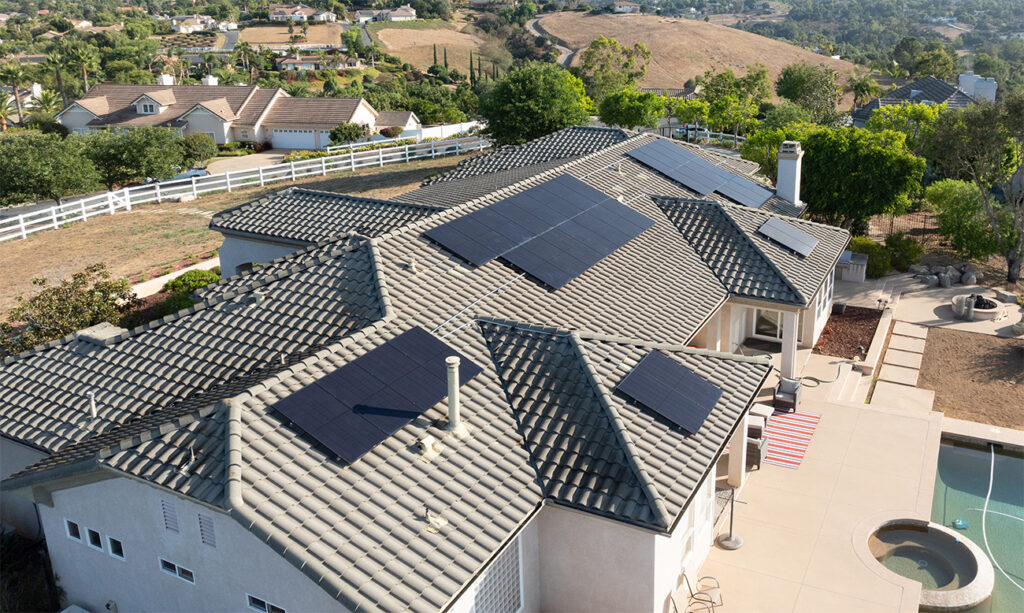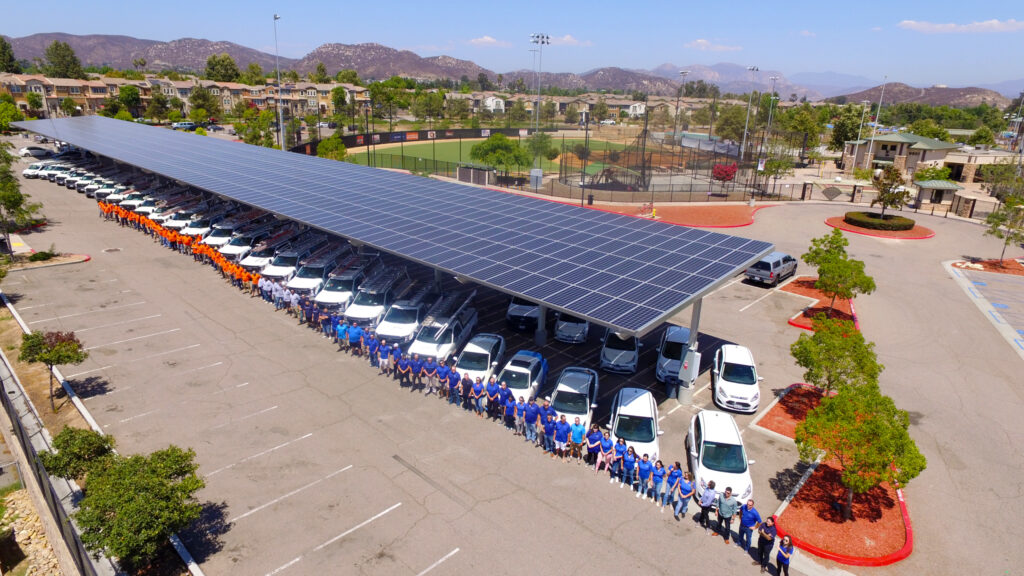Curious about your savings from solar power? A solar calculator can estimate this quickly by inputting your location and electricity bill. Discover how to use it and understand your solar potential.
Key Takeaways
-
SolarTech’s Solar Calculator provides personalized estimates of potential savings from installing solar panels, using user inputs like location and electricity bills.
-
The calculator assesses various factors, such as local utility rates and available incentives, to deliver accurate projections of savings and return on investment for solar energy.
-
Adopting solar energy not only offers financial benefits, like reduced electricity costs, but also contributes to environmental improvements and local economic growth.
Calculate Your Solar Savings:The Best Solar Calculator for Your Home
Curious about potential savings from switching to solar energy? Solar calculators offer accurate estimates based on user input, helping you evaluate the feasibility and financial benefits of solar systems and a solar energy system. At SolarTech, we recognize that every home and business is unique. That’s why we’ve created a user-friendly Solar Calculator to estimate your potential savings and benefits.
The SolarTech Solar Calculator is designed to give you a clear picture of how much solar power can offset your electricity costs. By entering simple information such as your location and average monthly electric bill, our calculator provides detailed insights into potential savings. This tool not only estimates how much solar costs but also highlights how much you can save, making the transition to solar power a financially sound decision.
As electricity costs rise and environmental awareness grows, now is an ideal time to explore solar energy. Our Solar Calculator helps you take the first step toward a greener, more cost-effective future.
Our Solar Calculator also helps you understand your solar savings potential by providing detailed insights into how much you can save with a solar energy system.
Why wait? Calculate your solar savings today and discover the benefits of this clean energy solution.
Introduction
Navigating solar energy can seem complex, but with the right tools, it becomes straightforward. SolarTech’s Solar Calculator provides personalized, accurate assessments to maximize your solar investment. Simply log in, enter a few home details, and receive a comprehensive solar potential analysis and solar savings potential instantly.
Consider a family in a sunny location with high electricity bills. Using the SolarTech Solar Calculator, they quickly discover potential savings from installing solar panels and potential pv installations. This tool leverages advanced algorithms and reliable data, helping thousands understand their solar potential.
Understanding Solar Savings
Understanding solar savings is crucial for homeowners who want to make an informed decision about investing in solar panels. Solar savings refer to the amount of money you can save on your electricity bills by generating your own electricity using solar power. The amount of solar savings you can expect depends on several factors, including the size and efficiency of your solar panel system, the amount of sunlight your roof receives, and the local electricity rates.
When you install solar panels, you essentially create your own mini power plant on your roof. This means you can generate electricity during the day, reducing the amount you need to buy from your utility company. Over time, these savings can add up significantly, especially as electricity rates continue to rise. Additionally, many regions offer incentives and rebates that can further enhance your savings, making solar power an even more attractive investment.
What Insights Can You Gain from SolarTech’s Solar Calculator?
SolarTech’s Solar Calculator uses extensive data and advanced algorithms to offer insights into your solar potential and solar savings potential. Tools like Aurora Solar and PVWatts estimate energy production and costs, providing a clear picture of potential savings. Reliable sources like the National Solar Radiation Database ensure credible estimates.
This integration of robust algorithms and dependable solar data sources is critical for making informed decisions about solar investments.
How Solar Calculators Work

Solar calculators are online tools that help homeowners estimate their solar savings potential. These calculators use data from various sources, including the National Renewable Energy Laboratory (NREL), to provide personalized estimates of solar savings. Solar calculators typically ask for information about your roof size, shape, and orientation, as well as your current electricity usage and local electricity rates. They then use this information to estimate the amount of electricity your solar panel system can generate and the corresponding savings on your electricity bills.
By inputting your specific details, such as your address and average monthly electric bill, the calculator can analyze your roof’s solar potential using advanced algorithms and satellite imagery. This allows it to provide a detailed estimate of how much energy your solar system can produce and how much you can save. These tools are invaluable for homeowners looking to understand the financial benefits of switching to solar power.
Using Data from the National Renewable Energy Laboratory
The National Renewable Energy Laboratory (NREL) is a leading research institution in the field of renewable energy. NREL provides data and tools that help homeowners and solar installers estimate solar savings potential. Solar calculators often use NREL’s data on solar irradiance, which is the amount of sunlight that hits a particular location, to estimate the amount of electricity that can be generated by a solar panel system. NREL’s data is widely recognized as the most accurate and reliable source of information on solar energy potential.
By leveraging NREL’s comprehensive solar data, solar calculators can offer precise and reliable estimates. This data includes information on local weather patterns, historical sunlight exposure, and other critical factors that influence solar energy production. As a result, homeowners can trust that the estimates provided by these calculators are based on the best available information, helping them make informed decisions about their solar investments.
Estimating Energy Savings
A key advantage of solar calculators and a solar energy system is their ability to accurately estimate energy savings based on user-specific data like location and electricity usage. For San Diego residents, switching to solar can significantly reduce electricity bills. Even without federal tax credits, solar energy costs in San Diego can be much lower than grid electricity, offering substantial savings.
Solar calculators consider local electricity rates, usage patterns, and solar generation potential to provide a comprehensive savings estimate. Transitioning to solar can save money on your electric bill and contribute to a cleaner environment.
The financial benefits are clear, and the process of estimating these savings is made easy with the use of advanced solar calculators.
Monthly and Annual Savings
Inputting your electricity bill and roof characteristics into solar calculators reveals insights into monthly and annual savings and solar savings potential. These tools offer a detailed breakdown of expected savings each month and year, helping you plan finances and recognize long-term benefits of switching to solar.
Return on Investment and Payback Period
The payback period for solar investments is the time it takes for energy savings to cover the initial installation cost. Factors influencing payback periods include local electricity rates, usage patterns, and financing options.
Solar calculators use these factors to estimate return on investment (ROI), aiding users in assessing the viability of their solar investments.
Customizing Your Solar System

Every home has unique energy needs. Solar calculators offer tailored recommendations based on user inputs, optimizing system design for specific conditions. Whether you have a small roof or a large commercial building, these tools help determine the best solar setup. Users can also select options like financing preferences and home battery storage for a personalized experience.
Customizing your solar energy system involves evaluating energy consumption, available roof area, and other location-specific factors. This ensures your solar installation is optimized for maximum efficiency and savings. Solar calculators simplify this process, guiding you every step of the way.
Sizing Your Solar Panels and System
Determining the right size of a solar energy system involves evaluating energy consumption and available roof area. Factors like roof size, roof shape, shading, tilt, and location are crucial in assessing rooftop solar potential.
Solar calculators guide users to the right solar system size and type, ensuring optimal performance and savings.
Adding Battery Storage
Adding battery storage offers significant benefits, such as enhanced energy independence and savings during peak utility rates. Solar calculators enable users to explore potential savings from integrating battery systems into their solar energy system setups.
Battery systems reduce reliance on the grid during peak hours, leading to substantial savings on energy bills.
Incentives and Rebates
Financial incentives like tax credits are incorporated into solar calculators to clarify long-term savings and solar savings potential. Solar initiatives in San Diego significantly contribute to clean energy targets and foster energy independence, promoting sustainability and making solar installations more financially feasible.
Solar calculators often include information about federal, state, and local incentives such as tax credits, net metering, or rebates available in San Diego. These incentives significantly enhance the financial feasibility of installing solar panels, making it easier to transition to solar power and enjoy long-term savings.
Federal Tax Credits
The federal solar tax credit allows homeowners to deduct a percentage of the solar system’s cost from their federal taxes, currently set at 30% for installations completed between 2022 and 2032, with no maximum limit on the amount that can be claimed.
To claim this credit, taxpayers complete IRS Form 5695 and submit it with their annual tax return.
State and Local Rebates
Net metering is a billing structure for solar owners, enabling them to earn credits for excess energy sent to the grid. In California, NEM 3.0 has impacted net metering policies, potentially affecting solar savings. Additionally, California offers a property tax exclusion for solar systems, ensuring they are not included in property assessments.
Programs like the Self-Generation Incentive Program and the Green Building Incentive Program offer additional financial incentives for solar installations.
Community Impact of Solar Energy
Adopting solar energy profoundly impacts the community, both environmentally and economically. Solar calculators estimate reductions in carbon emissions, providing insights into the environmental benefits and solar savings potential of solar installations. This empowers homeowners and businesses to understand the ecological advantages of adopting solar energy.
The economic impact of solar energy is significant, creating numerous job opportunities and contributing to local economic growth and workforce development. By supporting the local economy and providing employment opportunities across various skill levels, the solar sector enhances overall community prosperity.
Environmental Benefits
Utilizing solar energy helps San Diego decrease its carbon footprint and harmful emissions, contributing to a cleaner environment. Adopting solar energy reduces greenhouse gas emissions, directly addressing climate change and its associated environmental issues.
Solar calculators offer insights into reduced carbon footprints, appealing to eco-conscious individuals.
Economic Benefits
The growth of the solar sector and solar energy system in San Diego has generated numerous job opportunities, supporting local economic expansion. These jobs not only support individuals and families but also stimulate regional economic activity, enhancing overall community prosperity.
Using a Solar Calculator in San Diego
San Diego’s climate and sunshine make it ideal for solar installations. Users can access the Sun Number score by entering their address in the analysis region. Through Project Sunroof, users can discover their solar savings potential based on their location. Net metering allows solar system owners to receive credits for surplus energy contributed to the grid, offsetting future electricity bills.
California’s NEM 3.0 regulation alters how net metering credits are calculated and distributed to solar energy producers. Despite these changes, installing solar panels in California remains beneficial, offering significant savings.
Pairing solar with battery storage maximizes savings under NEM 3.0.
Climate and Sunlight Availability
San Diego’s favorable climate and abundant sunshine make it one of the best U.S. locations for solar energy production and solar energy system. The region averages daily energy production of 4.94 kWh in autumn, 3.78 kWh in winter, and 6.52 kWh in spring.
These factors make San Diego ideal for solar installations, which can be highlighted in the calculator results.
Utility Rates and Savings
The payback period for solar investments and a solar energy system varies based on local electricity rates and available incentives. Under NEM 3.0, it is harder for solar customers to completely offset their monthly utility bill, often resulting in leftover electricity charges.
Despite these challenges, significant savings can still be achieved by transitioning to solar power and leveraging available incentives.
Common Concerns and Misconceptions
There are several common concerns and misconceptions about solar panels that can make homeowners hesitant to invest in solar energy. Some of the most common concerns include the high upfront cost of solar panels, the intermittency of solar energy, and the potential impact on property values. However, these concerns are often based on outdated information or misconceptions about solar energy.
For instance, many people still believe that solar panels are prohibitively expensive. While this may have been true in the past, the cost of solar panels has decreased significantly in recent years, making them more accessible to a wider range of homeowners. Additionally, advancements in technology and increased competition among manufacturers have further driven down prices, making solar power a more viable option for many.
Addressing Common Concerns
One of the most common concerns about solar panels is the high upfront cost. However, the cost of solar panels has decreased significantly over the years, making them more affordable for homeowners. Additionally, many solar installers offer financing options and incentives that can help reduce the upfront cost of solar panels. Another common concern is the intermittency of solar energy, which refers to the fact that solar panels only generate electricity when the sun is shining. However, this concern can be addressed by investing in energy storage systems, such as batteries, that can store excess energy generated by solar panels during the day for use at night or during power outages. Finally, some homeowners may be concerned about the potential impact of solar panels on property values. However, studies have shown that solar panels can actually increase property values by providing a source of clean and renewable energy.
By addressing these concerns with up-to-date information and practical solutions, homeowners can feel more confident about investing in solar energy. The financial benefits, combined with the positive environmental impact, make solar panels a smart choice for those looking to reduce their electricity bills and contribute to a more sustainable future.
Choosing the Right Solar Installer

Selecting the right solar installer for your solar energy system is a critical step in your solar journey. Local installers often offer superior customer service compared to larger, national firms. When choosing an installer, consider factors beyond price, such as equipment quality and service level. Installers with positive reviews and high-quality equipment deliver better service, ensuring a smooth and successful installation.
A thorough vetting process ensures only highly qualified solar companies are recommended. This includes checking for appropriate licenses and certifications to ensure installer credibility. Certifications like NABCEP confirm the professionalism and expertise of installers. By following these guidelines, you can confidently choose the right installer for your solar project.
Summary
Switching to solar energy is a significant step towards financial savings and environmental sustainability. Using a solar calculator simplifies this process, providing accurate estimates of potential savings, return on investment, and system customization options. SolarTech’s Solar Calculator is an invaluable tool that helps you understand your solar potential, taking into account your specific location, roof characteristics, and energy needs.
By considering factors such as federal tax credits, state and local rebates, and the broader community impact, you can make an informed decision about going solar. The journey doesn’t stop at savings—choosing the right solar installer ensures a smooth transition to solar power, maximizing your benefits. Empowered with this knowledge, you are now ready to take the leap towards a cleaner, more cost-effective future with solar energy.
Frequently Asked Questions
How do I use a solar calculator?
To effectively use a solar calculator, enter your address and average monthly electricity bill. This will allow the calculator to analyze your roof’s solar potential and provide tailored savings estimates.
What information do I need to provide for accurate estimates?
To obtain accurate estimates, provide your address, average monthly electricity bill, and details about your roof characteristics. This information ensures the calculator can generate precise savings estimates.
How does a solar calculator determine my savings?
A solar calculator estimates your savings by utilizing algorithms and data sources, like the National Solar Radiation Database, to analyze factors such as your location and roof characteristics. This allows for tailored calculations of energy production and potential financial benefits.
What are the benefits of adding battery storage to my solar system?
Adding battery storage to your solar system enhances energy independence and allows you to save on electricity costs during peak utility rate periods. This investment can significantly improve your overall energy efficiency and savings.
How can I ensure I choose a reliable solar installer?
To ensure you choose a reliable solar installer, verify their credentials, including licenses and certifications like NABCEP, and compare multiple quotes while reading customer reviews. SolarTech has been in business for more than 20 years and have completed over 13,000 solar projects in California and Arizona.



